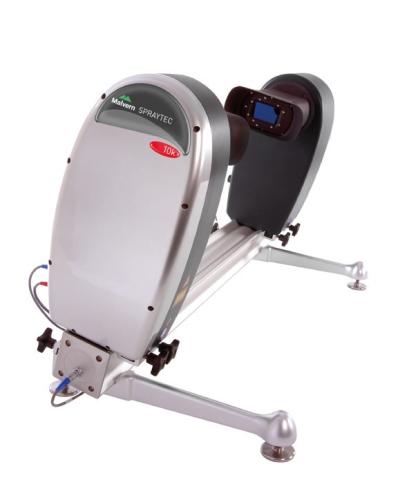
External users: registration to be carried out only through I-STEM portal
Additional information about sample and analysis details should be filled in the pdf form provided in the I-STEM portal under “DOWNLOAD CSRF”
Internal users (IITB): registration to be carried out only through DRONA portal
Additional information about sample and analysis details should be filled in the pdf form provided here.
.
Category
- Diffraction » Scattering
Booking Details
Facility Management Team and Location
Prof. Nagendra Kumar
Prof. Kowsik Bodi
Prof. Abhijeet Kumar
Facility Features, Working Principle and Specifications
Facility Description
Malvern Panalytical's Spraytec laser diffraction system allows measurement of spray particle and spray droplet size distributions in real-time for more efficient product development of sprays and aerosols. It has been specifically designed to address the unique requirements for spray characterization and deliver robust, reproducible droplet size data.
The Malvern Panalytical Spraytec uses the technique of laser diffraction for measurement of the size of spray droplets and spray particles. It does this by measuring the intensity of light scattered as a laser beam passes through a spray. The angular scattering intensity data is then analyzed to calculate the size of the particles responsible for creating the scattering pattern, using the Mie theory of light scattering.
Measurement principle:- Laser diffraction
Size range:- 0.1 µm - 2000 µm
Optical models:- Mie Theory and Fraunhofer Approximation including Patented Multiple Scattering correction
Lens ranges:- 300 mm lens: 0.1 µm - 900 µm (Dv50: 0.5 µm - 600 µm), 750 mm lens:- 2.0 µm - 2000 µm (Dv50: 5 µm - 1600 µm)
Working range:- 150 mm at 0.5 µm extending to >1 m above 5 µm
Concentration range:- Minimum acceptable transmission 5% (dependent on particle size range)
Detection system:- 36 element log-spaced silicon diode detector array
Light source:- Max 4mW He-Ne Laser, 632.8nm
Laser Safety:- Class 3R laser product
Optical alignment system:- Automatic rapid align system
Maximum acquisition rate:- Continuous Mode: 1 Hz,
Rapid Mode: 2.5 kHz as standard, 10 kHz with additional software feature key
Accuracy:- Better than +/- 1% on the Dv50 for NIST-traceable latex standards
Precision / Repeatability:- Better than +/- 1% COV on the Dv50 for NIST-traceable latex standards
Measurement triggering Internal:- Based on transmission or light scattering levels
External:- Based on TTL input or simple switch trigger
External device synchronization:- Via two TTL trigger outputs
Temperature:- 15°C - 35°C
Humidity:- 35% - 80%, non-condensing
Sample Preparation, User Instructions and Precautionary Measures
- User has to bring their own atomizers for testing as well as the special test fluids like distilled water. Facilities like compressed air storage, normal tap water, basic fittings and valves are available. However, special fixtures, stands or any such requirement has to be brought by the user.
- Experiments should be discussed with PI/TA and the facility in-charge before proceeding.
- Bring your own portable data storage (CD/pen drive/hard disc) for taking away experimental data.
- Avoid eye and skin exposure to direct or scattered radiation.
- While working with lasers do not wear reflective jewelry like watches and rings, as these might cause accidental hazardous reflections.
- Do not scratch or rub on lenses.
Charges for Analytical Services in Different Categories
Applications
Spray characterization of the atomizer used in various fields mentioned below:
- Aerospace Applications
- Automotive applications
- Process industries
- Biomedical/pharmaceutical applications
- Agricultural applications
Sample Details
Air or inert gases
